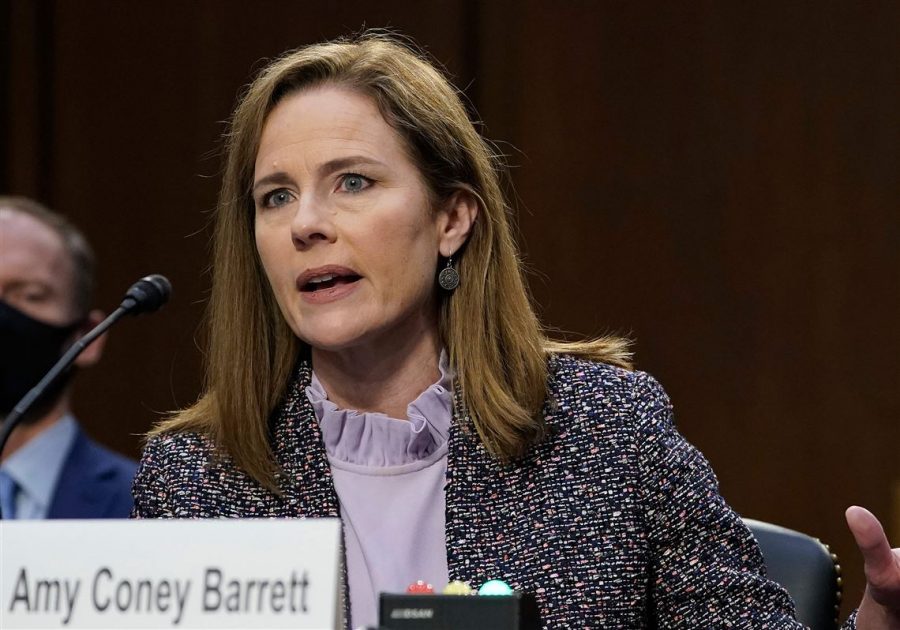Senate Confirms Amy Coney Barrett as Supreme Court Justice
November 21, 2020
On Monday, October 26th, the Senate voted to confirm Amy Coney Barrett to the Supreme Court. Barrett will fill the seat left by Justice Ruth Bader Ginsburg, who passed away on September 18th.
Experts have said that Amy Coney Barrett could help with issues such as campaign finance and gun rights. However, they also said she can make other issues such as abortion rights, voting rights, and health care regulations worse. Republicans were in the lead voting “yes” and Democrats voting “no.” However, one Republican, Sen. Susan Collins of Maine had a tough re-election race, so she voted “no” for that reason. Barrett is the first nominee to be confirmed with no votes from the opposition party, which in this case was the Democrats. Her nomination was very exciting for Republicans, so they made the courts their priority in the Senate. The Democrats on the other hand were against her nomination and told the Republicans not to fill a vacancy in an election year because in 2016 the Republican party leaders refused to do so when Barack Obama nominated Merrick Garland. Democrats were also against her nomination because it was Ruth Bader Ginsburg’s dying wish to wait until after the election to have her successor named by the next president of the United States.
The White House held a swearing-in ceremony where Barrett’s official constitutional oath was administered by Justice Clarence Thomas, the most conservative member of the court. At the ceremony, Trump noted that she is the fifth woman to sit to the high court. “This is a momentous day for America, the United States Constitution, and for the fair and impartial rule of law,” Trump said. “Justice Barrett made clear she will issue rulings based solely upon a faithful reading of the law and the Constitution as written not legislate from the bench.” He also added, “The Barrett family has captured America’s heart. It is highly fitting that Justice Barrett fills the seat of a true pioneer for women.” The next day, Chief Justice John Roberts administered the judicial oath in a private ceremony, officially making Barrett a justice.
In Barrett’s brief speech, she promised to rule from the bench with strict independence. She says, “It is the job of a senator to pursue her policy preferences. In fact, it would be a dereliction of duty for her to put policy goals aside. By contrast, it is the job of a judge to resist her policy preferences. It would be a dereliction of duty for her to give into them.”
Barrett could quickly begin to play a very influential role in the court; however, she cannot vote on cases that have already been heard, but she can help decide applications from states so the court can settle their disagreements about their methods of voting. She mostly sides with Republicans on issues, for example, curbside voting in Alabama and witness requirements in South Carolina. Senate Minority Leader Chuck Schumer has said, “the Republican majority is lighting its credibility on fire. And the next time the American people give Democrats a majority in this chamber, you will have forfeited your right to tell us how to run that majority. You walk a perilous road. I know you think this will eventually blow over. But you’re wrong. The American people will never forget this blatant act of bad faith.”
Following the vote confirming Barrett’s win, Biden released a statement where he called for people to vote. He said, “Vote to protect the fundamental idea that healthcare is a right, not a privilege. And vote for the legacy of the late Justice Ruth Bader Ginsburg.” Mike Pence, the vice president canceled plans to take the chair over the vote right after five people in his office have tested positive for COVID-19.
Democrats have warned that Barrett’s confirmation could lead to the end of the Affordable Care Act and they also argue that she would vote in favor of overturning the landmark 1973 Roe v. Wade decision, which made abortion legal nationwide.
